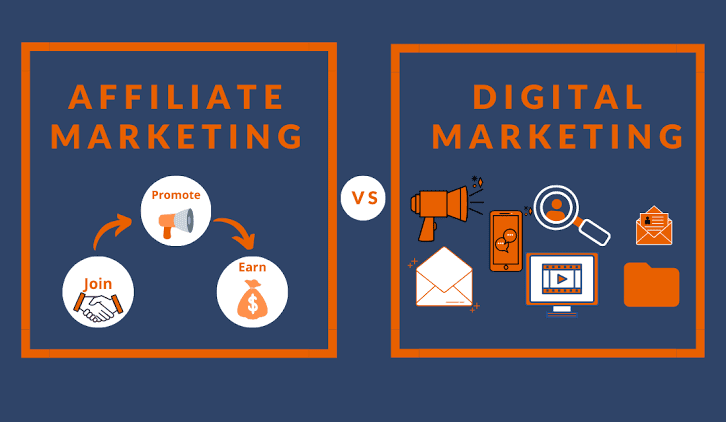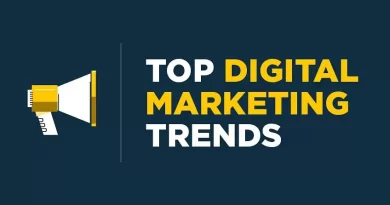Digital Marketing vs Affiliate Marketing: Demystifying the Differences and Synergies
In today’s ever-evolving digital landscape, businesses and individuals alike leverage various strategies to reach their target audiences and achieve their marketing goals. Two prominent approaches – digital marketing and affiliate marketing – often get mentioned in the same breath, but they are distinct disciplines with unique characteristics and applications.

Understanding the differences and potential synergies between digital marketing and affiliate marketing is crucial for anyone navigating the complex world of online marketing. Let’s delve into the details of each approach:
Digital Marketing:
- Concept: Digital marketing encompasses a comprehensive set of strategies and tactics used to promote products, services, and brands through digital channels, including websites, email, social media, search engines, and more.
- Focus: Building brand awareness, generating leads, driving conversions, and fostering customer relationships.
- Methods: A diverse range of methods are employed, including SEO, PPC advertising, content marketing, social media marketing, email marketing, influencer marketing, etc.
- Control: Businesses have complete control over their messaging, branding, and campaign execution.
- Investment: Requires dedicated resources and budget allocation for various marketing activities.
- Benefits: Wide reach, measurable results, data-driven decision making, brand building, and long-term customer engagement.
Affiliate Marketing:
- Concept: Affiliate marketing involves partnering with individuals or websites (affiliates) to promote your products or services in exchange for a commission on each sale or lead generated.
- Focus: Driving sales and conversions through targeted referrals.
- Methods: Affiliate partners typically use their website, blog, social media channels, or email lists to promote the product and share unique tracking links to track conversions.
- Control: Businesses have less control over the messaging and branding used by affiliates, but they can set guidelines and monitor performance.
- Investment: Lower up-front costs, as affiliates are only paid based on performance.
- Benefits: Performance-based payment model, wider reach through affiliate network, increased brand exposure, and targeted traffic.
Key Differences:
Here’s a table summarizing the key differences between digital marketing and affiliate marketing:
| Feature | Digital Marketing | Affiliate Marketing |
|---|---|---|
| Concept | Comprehensive set of strategies to promote products/services | Partnering with others to promote products/services in exchange for commission |
| Focus | Brand awareness, lead generation, conversions, customer relationships | Driving sales and conversions |
| Methods | SEO, PPC, content marketing, social media, email, influencer marketing | Affiliate websites, social media, email marketing |
| Control | Full control over messaging and branding | Less control over messaging and branding |
| Investment | Higher upfront costs | Lower upfront costs |
| Benefits | Wide reach, measurable results, long-term customer engagement | Performance-based payment model, wider reach through affiliate network |
Synergies and Integration:
Despite their differences, digital marketing and affiliate marketing can be effectively integrated to achieve optimal results. Here’s how:
- Leverage affiliates to expand reach and target new audiences.
- Utilize digital marketing to amplify affiliate campaigns and drive traffic to their landing pages.
- Combine SEO strategies with affiliate marketing to improve website rankings and attract relevant leads.
- Develop engaging content that supports affiliate promotions and provides valuable information to potential customers.
- Utilize data analytics from both approaches to gain insights and optimize overall marketing efforts.
Choosing the Right Approach:
The best approach for your business depends on your specific goals, budget, and resources. Consider the following factors when making your decision:
- Your target audience: Where and how do they consume information?
- Your marketing budget: How much can you invest in marketing activities?
- Your level of expertise: Do you have the internal resources and skills to manage a comprehensive digital marketing strategy?
- Your desired level of control: Do you want complete control over your messaging and branding?
- Your product or service: Is it easily marketable through affiliate partners?

Conclusion:
Both digital marketing and affiliate marketing offer valuable tools for businesses to reach their target audiences and achieve their goals. By understanding the differences between these approaches and exploring potential synergies, you can develop a targeted and effective marketing strategy that drives results. Remember, the most successful approach often lies in a strategic integration of both methods, tailored to your specific needs and objectives.


